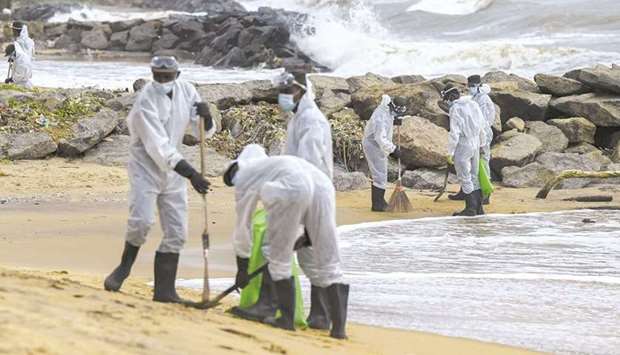Tonnes of plastic pellets from a burning container ship swamped Sri Lanka’s west coast yesterday, prompting a ban on fishing as international efforts to salvage the vessel dragged into a ninth day.
The government announced the ban along an 80km coastal area, including Colombo, fearing contamination with pollutants and plastic waste from the stricken ship.
“We will compensate the owners of 5,600 boats affected by the ban,” fisheries minister Kanchana Wijesekera said while adding that seafood currently in the market was safe for consumption.
Millions of plastic granules washed up at the holiday resort of Kalutara - 43kms south of Colombo - yesterday, a day after similar pollution at Negombo, a tourist and fishing area 40kms north of the capital.
Sri Lankan authorities meanwhile deployed hundreds of security personnel in hazmat suits to clean the beaches of plastic waste and other debris from the Singapore-registered MV X-Press Pearl burning since May 20.
Sri Lanka navy chief vice admiral Nishantha Ulugetenne said the fire was largely under control and the risk of the vessel breaking up had diminished.
“Right now there is no threat of the ship breaking up, but we don’t know how much of oil is still left,” Ulugetenne told reporters in Colombo.
Sri Lanka’s Marine Environment Protection Authority (MEPA) said a possible oil leak was the biggest threat, but the ship’s plastic cargo had already caused extensive damage.
The impact on mangroves and lagoons was still being estimated while a beach clean up was already underway.
Harm to marine wildlife and birds is also being assessed.
“Sri Lanka is one of the best bio-diverse countries in Asia and this type of plastic pollution, especially from microplastics can have long term repercussions,” MEPA chairperson Dharshani Lahandapura said.
“Microplastics are already an issue in the world’s oceans and this disaster here is making it worse for us.”
Microplastics are very small pieces of any type of plastic less than five millimetres and could be ingested by fish and in turn get into humans.
She said much of the cargo, including 25 tonnes of nitric acid, sodium hydroxide (caustic soda), lubricants and other chemicals appeared to have been destroyed in the huge fire.
Bulldozers scooped up tonnes of the polythene pellets that came from at least eight containers that fell off the ship on Tuesday.

Sri Lankan army soldiers work to remove debris washed ashore from the Singapore-registered container ship MV X-Press Pearl on a beach in Colombo yesterday.
